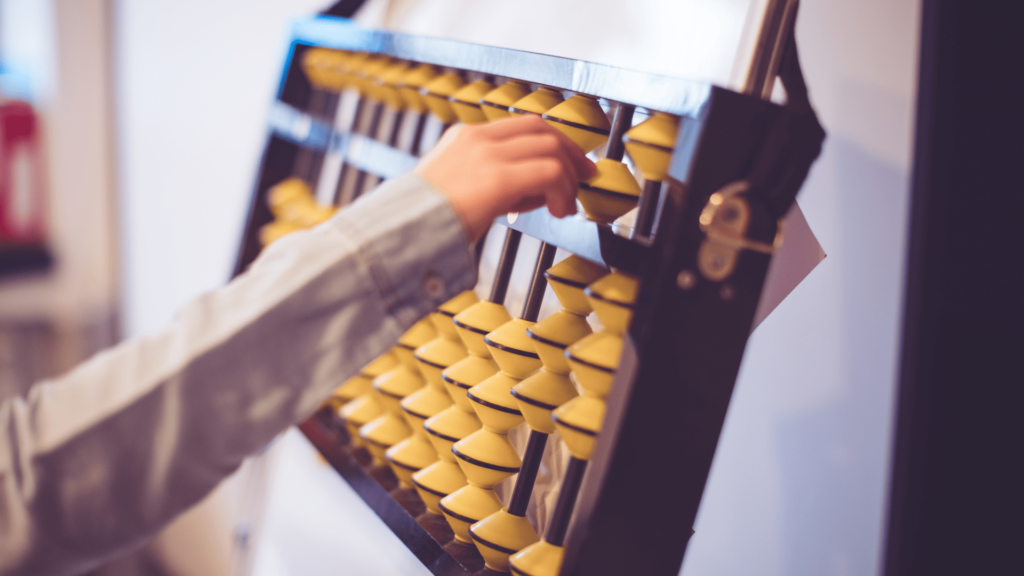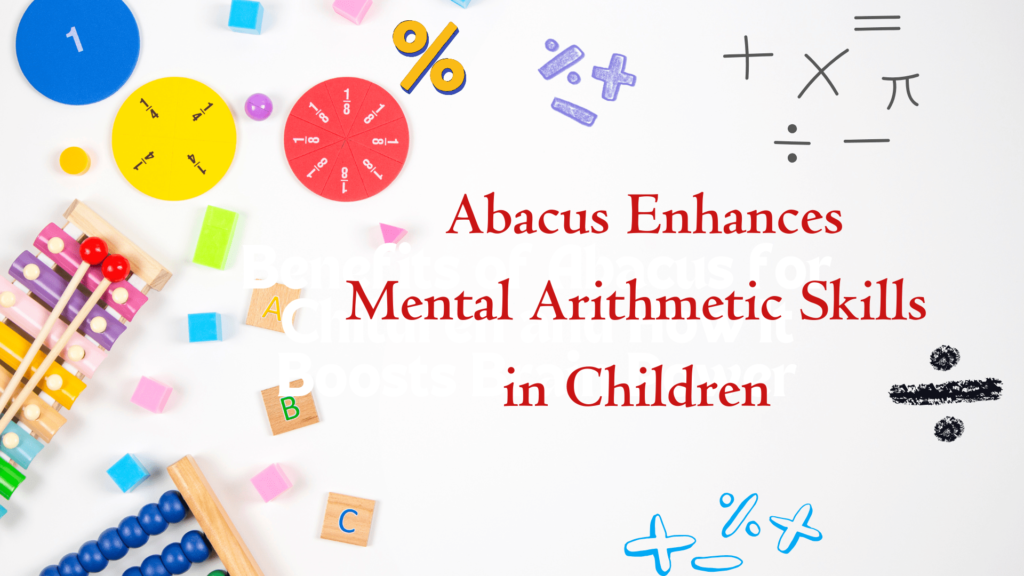Abacus mental arithmetic for children aged 5 to 14 offers a fun and effective way to build strong math skills. Through regular abacus training, kids improve their speed, accuracy, and confidence in solving problems. This mental math training supports early brain development, strengthens memory, and boosts cognitive abilities. Abacus classes for kids are ideal for building a strong academic foundation while making learning enjoyable and stress-free

Abacus Enhances Mental Arithmetic Skills in Children by Improving Speed and Accuracy
Abacus training is highly effective in building a child’s ability to perform quick and precise mathematical calculations. With consistent practice, kids learn to solve arithmetic problems mentally, without depending on fingers or calculators. This helps lay a strong foundation for advanced math learning and boosts academic performance over time.
Abacus learning teaches kids to calculate without using their fingers or calculators.
Through abacus practice, children become comfortable with numbers and gradually shift from physical bead movement to mental calculation. This mental visualization technique strengthens their brain’s ability to process numbers quickly and independently, leading to faster problem-solving in everyday life and school exams.
Regular practice improves number recognition, accuracy, and speed in solving problems.
Daily abacus training helps children develop strong number sense. They become more accurate with their answers and significantly reduce mistakes. The repetitive nature of abacus exercises boosts memory retention and sharpens concentration, allowing them to complete math tasks faster and with greater confidence.
Boosts Brain Development and Cognitive Function
Abacus learning plays a vital role in boosting brain development during a child’s early years. It is not just about mathematics it’s a powerful tool for overall mental growth. Regular abacus training enhances a child’s ability to think logically, analyze patterns, and recall information quickly. This leads to stronger academic performance and better decision-making skills in daily life.
Abacus training activates both the left and right brain hemispheres.
The physical act of moving beads combined with mental calculation stimulates both hemispheres of the brain. The left side is responsible for logical reasoning and numbers, while the right side supports imagination and visualization. This balanced brain activity helps children develop a sharper mind and better problem-solving abilities, making abacus one of the best tools for brain development in kids.Boosts Brain Developmen.
It supports memory, logic, and creativity, leading to stronger thinking skills.
Abacus learners often show improved memory retention due to constant mental engagement Boosts Brain Developmen. By remembering bead positions and solving complex equations mentally, children enhance their working memory. Additionally, the visual and tactile nature of abacus encourages creativity, allowing them to approach problems in unique and effective ways.
Enhances Focus and Concentration
Abacus training is an excellent way to improve a child’s focus and concentration, both inside and outside the classroom. The structure and discipline required in abacus classes teach children how to stay attentive, follow instructions, and complete tasks with minimal distraction. Over time, these habits carry over into schoolwork, helping them become more efficient learners
Abacus classes demand attention to bead movement and counting.
In abacus learning, every calculation requires close attention to how beads are moved and counted. This process helps children practice mindfulness and stay present during lessons. As they repeat these activities, their ability to concentrate on a single task improves significantly an important skill in today’s fast-paced, distracting world.
Kids become more focused during schoolwork and daily tasks.
The mental discipline learned through abacus carries over to academics and everyday life. Children trained in abacus tend to stay engaged longer in classroom activities, complete homework more efficiently, and approach challenges with a calm, focused mindset. These benefits make abacus classes a valuable tool for developing long-term attention and productivity.
Builds Confidence and Reduces Math Fear
Abacus learning is a powerful confidence booster for children who struggle with numbers. As kids begin to master mental math through abacus techniques, their self-belief grows. What once seemed like a difficult subject becomes manageable and even enjoyable. This positive shift in attitude often reflects in overall academic improvement.
Success with mental math boosts self-esteem in children.
When children solve problems quickly and correctly using abacus methods, they feel a sense of achievement. Each correct answer builds their confidence, showing them that they can succeed in math. This growing confidence encourages them to participate more in class and try new challenges without fear of failure..
Interactive methods remove stress and make math an enjoyable subject.
Abacus classes use hands-on tools and playful activities, turning math into a fun learning experience. The colorful beads and group activities create a stress-free environment, making kids excited to learn. This interactive approach helps eliminate math anxiety and replaces it with curiosity and enthusiasm.
Strengthens Visualization and Imagination
Abacus learning trains children to visualize numbers and bead movements in their minds, even without a physical abacus in front of them. This mental imagery skill sharpens their thinking and helps them solve problems faster. Over time, kids develop stronger imagination and mental agility skills that benefit them far beyond math class.
Students visualize the abacus to calculate in their minds, improving mental imagery.
As children progress through abacus training, they move from using the physical tool to solving equations by imagining bead positions. This powerful visualization practice activates the brain and builds mental pictures of numbers. The ability to mentally simulate and manipulate information enhances both memory and problem-solving efficiency.
This visualization skill also supports learning in science and language.
Visualization developed through abacus learning isn’t limited to math. Children also apply it while reading, understanding scientific diagrams, or imagining concepts in other subjects. Whether it’s visualizing story settings or grasping how machines work, abacus-trained students show better comprehension across various subjects.
Encourages Independent Learning
Abacus training helps children become confident, independent learners. Through regular practice and problem-solving, kids develop the ability to work through challenges on their own. This not only supports academic success but also builds life skills like responsibility and self-discipline, setting a strong foundation for future learnin
Children learn to solve problems on their own, building self-reliance.
Abacus encourages kids to think for themselves. Instead of relying on calculators or others for help, they learn to handle math problems independently. This boosts their confidence and shows them that with practice and focus, they can overcome any challenge on their own.
Abacus practice promotes discipline, patience, and goal-setting from a young age.
Regular abacus sessions require focus, repetition, and goal-oriented learning. Children learn to set small targets, stay committed, and practice consistently. These habits cultivate patience and self-discipline, which are essential not just in academics but in every aspect of a child’s growth.
Encourages Independent Learning
Abacus learning empowers children to take control of their education by encouraging self-directed learning. As they progress through levels, kids begin to understand concepts deeply and learn how to apply them without external help. This independence builds confidence and creates a positive mindset toward learning and problem-solving.
Children learn to solve problems on their own, building self-reliance.
One of the biggest benefits of abacus training is the development of self-reliance. Children are trained to approach math challenges with logic and clarity. They learn step-by-step methods to reach the correct answer, which helps them build problem-solving abilities that don’t depend on teachers or tools like calculators.
Abacus practice promotes discipline, patience, and goal-setting from a young age.
Abacus programs follow a structured approach with levels and milestones. To succeed, children must attend classes regularly, practice daily, and set goals for improvement. This process teaches them essential life skills like patience, consistency, and long-term focus skills that support both academic growth and personal development..
Supports Academic Performance
Abacus training for kids does more than just improve math skills. it positively influences overall academic performance. As children develop sharper thinking, concentration, and memory through abacus exercises, they begin to perform better in school. Their ability to grasp concepts quickly and solve problems with ease gives them an academic edge.
Children trained in abacus often excel in math, science, and logical subjects.
Abacus learners gain strong mental math skills, making subjects like science and math easier to understand. Their logical reasoning and number fluency allow them to approach complex topics with confidence, resulting in noticeable academic improvement.
Their enhanced problem-solving skills lead to better classroom results.
Abacus training builds strong problem-solving abilities. Children learn to break down problems, think critically, and find solutions independently. These skills are reflected in classroom tests and activities, helping them score higher and stay ahead in their studies.
Abacus Enhances Mental Arithmetic Skills in Children
Abacus learning for children is a proven method to develop strong mental arithmetic skills at an early age. By combining hands-on practice with mental visualization, abacus training strengthens the brain’s ability to perform calculations quickly and accurately without relying on calculators. It lays a solid math foundation that supports academic growth and confidence in problem-solving.
By blending physical bead movement with mental calculation, abacus builds a strong math foundation.
Children use both hands to move abacus beads, engaging both sides of the brain. This multi-sensory method boosts number sense, memory, and logical thinking. As a result, kids become comfortable with numbers and gain deeper understanding of basic arithmetic concepts—an essential part of early math education.
It trains young minds to think faster, process better, and solve problems with ease.
Abacus training improves brain processing speed and concentration. Children learn to visualize the abacus and solve problems mentally, which sharpens focus and boosts confidence. Over time, they develop the ability to perform complex calculations quickly an advantage that helps them excel in school and beyond.
Discussion
Abacus learning for children aged 5 to 14 is more than just a way to improve mental math it’s a complete brain development tool. From enhancing focus and memory to boosting academic performance, abacus classes in Pune and across India are helping young minds unlock their full potential. Whether your child struggles with numbers or simply wants to advance their skills, abacus training provides a solid foundation in mental arithmetic. It nurtures independence, sharpens logic, and builds confidence making it a smart investment in your child’s educational journey.
Table of Contents
Related Content – Online Abacus Maths Learning

